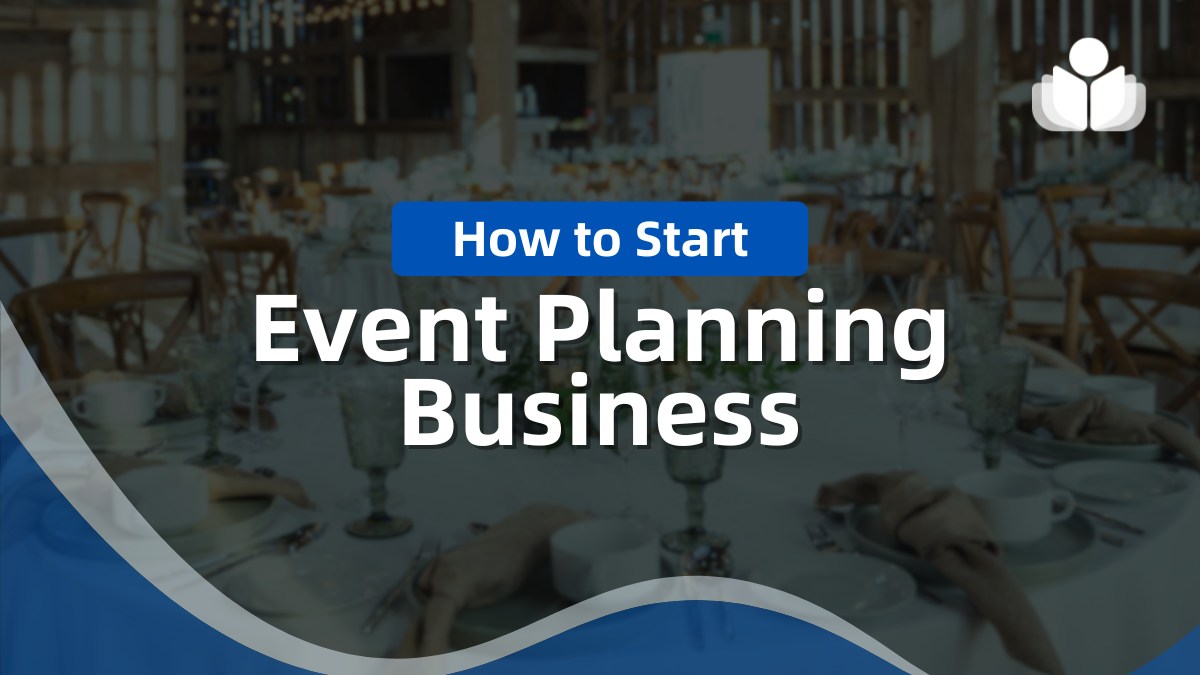Event planning focuses on making clients’ ideal events come to life, combining creativity and personalization. It includes a range of businesses, from full-service event coordinators to solo entrepreneurs operating from home.
Learning the steps to enter the event planning industry and start your own business is crucial in deciding if this career suits you. This article outlines event planning businesses, guides the launch of one, and highlights their significance.
>> Use Tailor Brands to Register Your Event Planning Business >>
What Does The Event Planning Business Involve?
An event-planning business, whether small or large, assists individuals and corporations in organizing and carrying out various events. These events range from personal celebrations like weddings and birthdays to professional gatherings such as graduation ceremonies and yearly conferences. Key duties of an event-planning business involve:
- Booking event locations
- Presenting clients with various venue and service choices, complete with prices and details
- Establishing and adhering to a budget
- Ensuring compliance with local regulations at each location
- Managing event specifics like guest lists, menus, transport, and seating plans
- Liaising with all vendors involved, such as catering, decoration, music, and photography
- Offering logistical assistance and resolving any problems that arise before or during the event
- Marketing services to prospective clients
- Handling ticket sales or distributing invitations to events
Pros of Launching an Event Planning Business
Creativity and Innovation: Event planning offers great creative freedom, as each event is unique, offering immense satisfaction for the creatively inclined.
Flexibility: Event planners often have the autonomy to decide their schedules and projects, ideal for those seeking a balance between work and life.
Consistent Demand: Event planners are needed regularly for various occasions, such as weddings, corporate gatherings, and charity events, ensuring a steady flow of opportunities.
Networking Opportunities: Working as an event planner involves interactions with a diverse group of vendors, clients, and participants, which provides ample networking opportunities.
Earning Potential: Event planning can be highly profitable, especially with experience and a strong reputation. High-profile events and upscale clients, in particular, can generate significant income.
>> Use Tailor Brands to Register Your Event Planning Business >>
Cons of Launching an Event Planning Business
- Stress and Pressure: Event planning ranks as one of the most stressful careers, needing to meet tight deadlines, fulfill high client expectations, and guarantee flawless event execution.
- Irregular Hours: Due to the nature of the job, event planners often work long, unpredictable hours, including weekends, evenings, and holidays.
- Financial Risk: Launching an event planning business involves initial investments in marketing, equipment, and possibly staff without an immediate return. Budgets for events may also be tight, requiring careful financial planning.
- Client Dependence: The success of event planning largely depends on securing and keeping a strong client base, posing challenges for newcomers and potentially leading to financial uncertainty.
- High Competition: The event planning sector is intensely competitive, with numerous individuals and businesses competing for a finite client pool, particularly in sought-after niches.
How to Start an Event Planning Business
To successfully launch your event planning business idea, follow these seven steps:
- Create a thorough business plan.
- Specify your event business’s scope, mission, and objectives.
- Conduct thorough market research.
- Account for startup expenses.
- Adhere to all legal requirements.
- Grasp the nature of the work and consider hiring staff (if necessary).
- Begin promoting your event planning services.
>> Use Tailor Brands to Register Your Event Planning Business >>
Step 1: Build a Solid Business Plan
Many small event-planning businesses collapse due to the need for a pre-prepared business plan. Begin by examining business plans from successful ventures within your field. Seek advice from peers in the event industry.
If you need to familiarize yourself with business plans, utilize online resources and templates. Maintaining an updated business plan is crucial to attracting investors for business expansion.
A business plan should serve as a structured guide for the startup phase and remain adaptable to changes post-launch. Essential elements of a business plan include:
- Specific goals and immediate objectives
- A review timeline, typically quarterly in the first year
- An overview of the staff structure and job descriptions
- Financial projections, including capital, monthly expenses, expected income, and accounting practices
- A detailed marketing and promotional strategy
Getting feedback from established business owners, especially those in event planning or hospitality, can offer targeted and valuable insights into your business plan.
Step 2: Define Your Scope of Work, Mission, and Goals for Your Event Business.
Even in the early stages of your event planning business, it’s crucial to define the services you will and won’t provide. Including this information on your website can help draw in the ideal clients.
As your business grows, turning down clients can be challenging but necessary. It helps to spend less time on customers who need to bring more value to your business.
>> Use Tailor Brands to Start an Event Planning Business >>
Step 3: Do Your Market Research
Start by identifying your target market to see if there’s a sufficient customer base for the services you want to provide. For instance, if you aim to organize lavish weddings, check if the income level of the local population matches your pricing.
Also, assess whether your target area’s cultural and religious practices align with your business goals. You might need to adjust your business plan or location if they still need to. This approach applies to various types of events.
Evaluate potential competitors, their client demographics, spending behaviors, and their client’s satisfaction. Compare their offerings with what you plan to provide to understand why clients might choose your business.
If your services overlap with existing providers, look for signs that demand exceeds supply, such as long client wait times or job vacancies on competitors’ websites, indicating room for your business to thrive.
Step 4: Consider Startup Costs
Starting an event planning business involves managing initial expenses. Keeping operations home-based or solo can minimize costs compared to hiring staff needing salaries.
To grow your event planning business, you might need additional equipment, an office, or a warehouse, which will increase your expenses and influence the type of business you start.
Once you secure consistent work, you can scale your business. You could begin as a solo operator, handling smaller events independently. As you accumulate profits from successful jobs, you can then afford to employ a team and lease a space for your equipment, such as cameras and furniture.
>> Use Tailor Brands to Start an Event Planning Business >>
Startup Expenses
Low
High
Rent
$0
$2,300
Equipment
$5,000
$17,000
Inventory
$0
$500
Licenses and Taxes
$250
$350
Communications
$100
$250
Payroll
$0
$4,000
Advertising/Promotion
$500
$2,000
Legal Fees & Accounting
$650
$1,500
Insurance (1st Quarter)
$800
$1,700
Miscellaneous
$750
$1,500
Total
$8,050
$31,100
Step 5. Follow All Legal Guidelines

Before launching your business, it’s essential to understand and adhere to any legal or financial regulations. Start by selecting a business structure, registering your business name, and obtaining a federal tax ID number. Then, check if your state requires a state tax ID and any necessary permits or licenses.
Creating a business plan simplifies the early stages of setting up your business.
Deciding on your business structure is crucial at this stage. Options include a sole proprietorship if you’re going solo, a partnership if you have co-founders, or a Limited Liability Company (LLC) to protect personal assets from business liabilities.
Each structure has implications for taxes and personal liability. It’s advisable to consult with a legal or business expert to choose the most suitable structure for your situation.
After settling on a structure, register your business, secure a tax ID, and obtain any required licenses and permits for operation. If you find this process daunting, consider utilizing a business registration service to streamline these steps. Below, I’ve listed some reputable services to consider.

Tailor Brands provides an online platform for easy and quick LLC registration, guiding entrepreneurs through each step. This service helps with the legal setup and paperwork needed to form a business as its legal entity.
Using Tailor Brands, entrepreneurs can secure a tax ID number, register for required licenses and permits, and access additional resources to ensure business success.

ZenBusiness stands out for its speedy business filing solutions and affordable incorporation fees. Its customer service team can readily assist during the registration process, though they cannot offer legal counsel.
Launching a business seems simpler than its upkeep, which is why ZenBusiness offers resources to simplify management. The service can handle tax documents and act as a registered agent, easing the administrative burden on business owners.

Northwest Registered Agent stands out in the company registration service industry for its commitment to transparency and treating customers with genuine care. This service is upfront about pricing and prides itself on exceptional, readily available customer support to ensure accuracy. Moreover, it prioritizes the protection of clients’ private information.
Step 6. Understand the Work Involved and Hire Employees (Optional)
To make your event planning service thrive, it’s crucial to understand the extensive work involved and decide on hiring staff.
Event planning typically includes:
- Designing the event to match the desired ambiance or theme, often incorporating clients’ specific requests.
- Creating a detailed proposal for client approval.
- Handling logistics like venue booking, vendor coordination, entertainer hiring, and arranging catering services.
Successfully planning even small events demands considerable effort, but gaining experience helps streamline these tasks.
For larger events, you might need additional hands. Hiring staff becomes necessary as your events grow, enabling you to manage more significant functions and increase profitability when you have the budget to expand your team.
Step 7. Settle on a Price Structure and Fee Basis
The frequency of requests for your event planning services can significantly depend on your pricing strategy. You can decide on your pricing model based on factors like:
- The type of events you specialize in, such as social events, might have different pricing than corporate ones.
- Your location: Higher living costs justify higher charges for your services.
- Your track record and reputation: A proven record of successful events allows you to command higher fees.
>> Use Tailor Brands to Register Your Business >>
Step 8. Start Marketing Your Event Planning Service
Once everything is set and you’ve figured out your pricing strategy, you can begin promoting your event planning service. Utilize online channels such as Google PPC ads, social media marketing, and traditional methods like posters or TV advertisements.
Launching an event planning service comes down to thorough preparation and thoughtful planning. With everything properly arranged, your service will start smoothly, attracting your initial clients swiftly.
Why Are Event Planning Businesses Valuable?
Event planning businesses provide immense value to both their owners and clients. They handle the organization and execution of events according to client specifications, significantly reducing the stress in planning.
These businesses cater to various events, from weddings and concerts to corporate gatherings, offering opportunities for creativity and networking. For entrepreneurs, the appeal of launching an event planning operation lies in its financial benefits.
The low initial and ongoing costs and distinct payment model mean that starting such a business carries little financial risk. The ability to operate virtually or on-site at event locations minimizes the need for a traditional office, cutting down on overhead costs.
Additionally, forging strong relationships with suppliers like venue owners and caterers enables these businesses to secure lower prices, enhancing their client offerings.
>> Use Tailor Brands to Register Your Business >>
Duties of an Event Planner
Event planner roles, whether full-time, part-time, or on-site, entail a variety of responsibilities:
- Conducting initial research for the event.
- Designing the event and organizing a project management team.
- Selecting the ideal venue for the event.
- Preparing event budgets and organizing fundraisers as needed.
- Organizing decor, entertainment, and catering services.
- Distributing invitations to guests.
- Arranging transportation for attendees.
- Managing seating and other accommodations.
- Coordinating tasks for event staff such as caterers and entertainers.
- Overseeing the event on-site to ensure everything runs smoothly.
Effective communication is essential in the events industry, including for wedding planners and other event types. While a bachelor’s degree in public relations or a similar field can be beneficial, it’s optional for success. Let’s explore this career and business opportunity more.
Why Do People Hire Event Planning Services?
Event planning services are sought for two primary reasons:
- To allow hosts and guests of honor to enjoy the event without worrying about its organization.
- To ensure the event runs smoothly without any hitches.
Take a wedding, for instance. Many couples engage event planners to manage all aspects of their wedding. This approach allows the couple to focus on celebrating their union rather than stressing over catering arrangements, parking logistics, or managing unruly guests.
The event planner handles all these aspects. Moreover, the complexity of some events, especially those with large numbers of attendees, often necessitates the expertise of a professional event planner.
Experienced planners possess the skills to manage large groups effectively, estimate food quantities accurately, and attend to numerous other details critical for an event’s success.
Who Should Become an Event Planner?
If organizing events and handling logistics excites you, consider a career as an event planner. This role demands managing various elements simultaneously, and many who enter this field have backgrounds in management or coordination in different sectors.
Pursuing event planning could be fulfilling if you thrive on the challenge and satisfaction of smoothly executing complex events. Be prepared for unconventional working hours, including weekends and holidays, as events often occur during these times.
The job can involve navigating through hectic situations and balancing diverse needs. Earning a certification can enhance your skills and open up more opportunities in event planning. Organizations like Meeting Professionals International (MPI) offer directories of accredited degrees and certifications.
Achieving a Certified Special Events Professional (CSEP) or Certified Meeting Planner (CMP) status through MPI or the International Special Events Society (ISES) can further establish your expertise in the field and potentially lead to better job prospects and higher earnings.
How to Start an Event Planning Business – FAQs
Looking for guidance on launching an event planning business?
Bottom Line – How to Start an Event Planning Business
Event planning is an exciting and creative field, perfect for those who are organized, enjoy working with diverse people, and thrive under pressure. Starting an event planning business could be your calling if you’re passionate about creating memorable client experiences and have a knack for detailed planning.
Before diving into organizing your first event, crafting a comprehensive business plan is crucial. This plan will guide your business, help you navigate challenges, and spur growth. Financial management is also key in the event planning industry, so choosing the right merchant service providers to ease financial transactions is essential.
If you’re drawn to the dynamic nature of event planning, eager to enter a competitive market, and happy to contribute to event success, launching your own event planning business might be the perfect venture for you.
 Sections of this topic
Sections of this topic
















